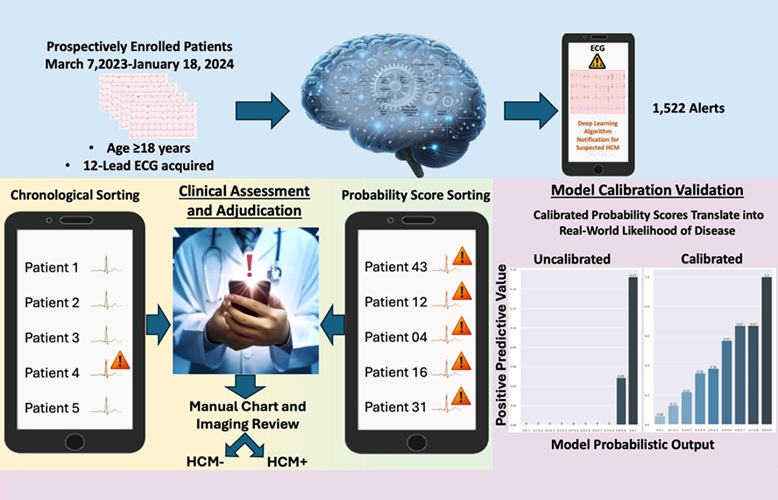Agilent Launches New Immunoassay Kit to Detect SARS-CoV-2 Antibodies
|
By HospiMedica International staff writers Posted on 22 Feb 2021 |

Illustration
Agilent Technologies (Santa Clara, CA, USA) has launched the Agilent Dako SARS-CoV-2 IgG Enzyme-Linked Immunosorbent Assay (ELISA) kit intended for the qualitative detection of immunoglobulin G (IgG) antibodies to SARS-CoV-2 in human serum or plasma.
The kit, which marks Agilent’s entry into SARS-CoV-2 testing in the US, is a qualitative two-step indirect ELISA for the detection of human IgG antibodies to the SARS-CoV-2 S1 RBD protein. It is intended for use as an aid in identifying individuals with an adaptive immune response to SARS-CoV-2, indicating recent or prior infection. In Agilent’s clinical study, the SARS-CoV-2 IgG ELISA kit proved to be a highly accurate immunoassay with 98.9% sensitivity and 98.8% specificity.
The ELISA kit includes consumables that meet the needs for small to medium-sized clinical labs to ensure easy and sustainable access to serology tests when the demands arise. By providing a kit that contains all the necessary reagents - including negative, positive, and cut-off controls - Agilent has developed a ready-to-use solution that enables labs to consistently execute dependable SARS-COV-2 serological testing. Agilent has developed the SARS-CoV-2 IgG ELISA assay using microplate liquid handlers and plate readers from its recent acquisition of BioTek.
Leveraging its expertise as a provider of high-quality antibodies and assay solutions for many top IVD manufacturers globally, Agilent is introducing the high-performance kit as its initial entry into SARS-CoV-2 serological testing. This is the first of multiple tests that are planned by the company to support the management of this disease in patients who have been exposed to COVID-19. In addition to this immunoassay test, Agilent is developing a quantitative RT-PCR SARS-CoV-2 test, which will be CE marked in Europe, as well as registered in additional countries throughout the world.
"Implementing new technologies into clinical workflows can be daunting, and the pressures of the SARS-CoV-2 pandemic have further exacerbated the need for technology solutions that are quick and easy to implement,” said Sam Raha, president of Agilent’s Diagnostics and Genomics Group. “Providing turnkey solutions eases the implementation and validation resources for clinical labs, which helps lower the barrier to the adoption of additional SARS-CoV-2 tests.”
Related Links:
Agilent Technologies
The kit, which marks Agilent’s entry into SARS-CoV-2 testing in the US, is a qualitative two-step indirect ELISA for the detection of human IgG antibodies to the SARS-CoV-2 S1 RBD protein. It is intended for use as an aid in identifying individuals with an adaptive immune response to SARS-CoV-2, indicating recent or prior infection. In Agilent’s clinical study, the SARS-CoV-2 IgG ELISA kit proved to be a highly accurate immunoassay with 98.9% sensitivity and 98.8% specificity.
The ELISA kit includes consumables that meet the needs for small to medium-sized clinical labs to ensure easy and sustainable access to serology tests when the demands arise. By providing a kit that contains all the necessary reagents - including negative, positive, and cut-off controls - Agilent has developed a ready-to-use solution that enables labs to consistently execute dependable SARS-COV-2 serological testing. Agilent has developed the SARS-CoV-2 IgG ELISA assay using microplate liquid handlers and plate readers from its recent acquisition of BioTek.
Leveraging its expertise as a provider of high-quality antibodies and assay solutions for many top IVD manufacturers globally, Agilent is introducing the high-performance kit as its initial entry into SARS-CoV-2 serological testing. This is the first of multiple tests that are planned by the company to support the management of this disease in patients who have been exposed to COVID-19. In addition to this immunoassay test, Agilent is developing a quantitative RT-PCR SARS-CoV-2 test, which will be CE marked in Europe, as well as registered in additional countries throughout the world.
"Implementing new technologies into clinical workflows can be daunting, and the pressures of the SARS-CoV-2 pandemic have further exacerbated the need for technology solutions that are quick and easy to implement,” said Sam Raha, president of Agilent’s Diagnostics and Genomics Group. “Providing turnkey solutions eases the implementation and validation resources for clinical labs, which helps lower the barrier to the adoption of additional SARS-CoV-2 tests.”
Related Links:
Agilent Technologies
Latest COVID-19 News
- Low-Cost System Detects SARS-CoV-2 Virus in Hospital Air Using High-Tech Bubbles
- World's First Inhalable COVID-19 Vaccine Approved in China
- COVID-19 Vaccine Patch Fights SARS-CoV-2 Variants Better than Needles
- Blood Viscosity Testing Can Predict Risk of Death in Hospitalized COVID-19 Patients
- ‘Covid Computer’ Uses AI to Detect COVID-19 from Chest CT Scans
- MRI Lung-Imaging Technique Shows Cause of Long-COVID Symptoms
- Chest CT Scans of COVID-19 Patients Could Help Distinguish Between SARS-CoV-2 Variants
- Specialized MRI Detects Lung Abnormalities in Non-Hospitalized Long COVID Patients
- AI Algorithm Identifies Hospitalized Patients at Highest Risk of Dying From COVID-19
- Sweat Sensor Detects Key Biomarkers That Provide Early Warning of COVID-19 and Flu
- Study Assesses Impact of COVID-19 on Ventilation/Perfusion Scintigraphy
- CT Imaging Study Finds Vaccination Reduces Risk of COVID-19 Associated Pulmonary Embolism
- Third Day in Hospital a ‘Tipping Point’ in Severity of COVID-19 Pneumonia
- Longer Interval Between COVID-19 Vaccines Generates Up to Nine Times as Many Antibodies
- AI Model for Monitoring COVID-19 Predicts Mortality Within First 30 Days of Admission
- AI Predicts COVID Prognosis at Near-Expert Level Based Off CT Scans
Channels
Critical Care
view channel
Smart Bandage Monitors Chronic Wounds in Human Patients
A future smart bandage, envisioned as a "lab on skin," could assist both patients and caregivers by not only monitoring chronic wounds but also delivering treatment and accelerating the healing process... Read more
AI Identifies Patients with Increased Lung Cancer Risk Up To 4 Months Earlier
Earlier diagnosis plays a crucial role in improving the prognosis of cancer, as delays in starting therapy are associated with decreased survival rates. In most cases, cancer is first identified when symptoms... Read more
AI Algorithm Identifies High-Risk Heart Patients
Hypertrophic cardiomyopathy (HCM) is a complex condition characterized by the thickening of the heart muscle, which impairs the heart's ability to pump blood effectively. This forces the heart to work... Read more
Next Gen Hemodynamic Monitoring Solution Provides AI-Driven Clinical Decision Support
A new cutting-edge hemodynamic monitoring platform, equipped with predictive artificial intelligence (AI)-based algorithms, is designed to help clinicians proactively manage blood pressure fluctuations... Read moreSurgical Techniques
view channel
DNA Origami Improves Imaging of Dense Pancreatic Tissue for Cancer Detection and Treatment
One of the challenges of fighting pancreatic cancer is finding ways to penetrate the organ’s dense tissue to define the margins between malignant and normal tissue. Now, a new study uses DNA origami structures... Read more
Pioneering Sutureless Coronary Bypass Technology to Eliminate Open-Chest Procedures
In patients with coronary artery disease, certain blood vessels may be narrowed or blocked, requiring a stent or a bypass (also known as diversion) to restore blood flow to the heart. Bypass surgeries... Read more
Intravascular Imaging for Guiding Stent Implantation Ensures Safer Stenting Procedures
Patients diagnosed with coronary artery disease, which is caused by plaque accumulation within the arteries leading to chest pain, shortness of breath, and potential heart attacks, frequently undergo percutaneous... Read more
World's First AI Surgical Guidance Platform Allows Surgeons to Measure Success in Real-Time
Surgeons have always faced challenges in measuring their progress toward surgical goals during procedures. Traditionally, obtaining measurements required stepping out of the sterile environment to perform... Read morePatient Care
view channel
Portable Biosensor Platform to Reduce Hospital-Acquired Infections
Approximately 4 million patients in the European Union acquire healthcare-associated infections (HAIs) or nosocomial infections each year, with around 37,000 deaths directly resulting from these infections,... Read moreFirst-Of-Its-Kind Portable Germicidal Light Technology Disinfects High-Touch Clinical Surfaces in Seconds
Reducing healthcare-acquired infections (HAIs) remains a pressing issue within global healthcare systems. In the United States alone, 1.7 million patients contract HAIs annually, leading to approximately... Read more
Surgical Capacity Optimization Solution Helps Hospitals Boost OR Utilization
An innovative solution has the capability to transform surgical capacity utilization by targeting the root cause of surgical block time inefficiencies. Fujitsu Limited’s (Tokyo, Japan) Surgical Capacity... Read more
Game-Changing Innovation in Surgical Instrument Sterilization Significantly Improves OR Throughput
A groundbreaking innovation enables hospitals to significantly improve instrument processing time and throughput in operating rooms (ORs) and sterile processing departments. Turbett Surgical, Inc.... Read moreHealth IT
view channel
Printable Molecule-Selective Nanoparticles Enable Mass Production of Wearable Biosensors
The future of medicine is likely to focus on the personalization of healthcare—understanding exactly what an individual requires and delivering the appropriate combination of nutrients, metabolites, and... Read more
Smartwatches Could Detect Congestive Heart Failure
Diagnosing congestive heart failure (CHF) typically requires expensive and time-consuming imaging techniques like echocardiography, also known as cardiac ultrasound. Previously, detecting CHF by analyzing... Read moreBusiness
view channel
Expanded Collaboration to Transform OR Technology Through AI and Automation
The expansion of an existing collaboration between three leading companies aims to develop artificial intelligence (AI)-driven solutions for smart operating rooms with sophisticated monitoring and automation.... Read more
















